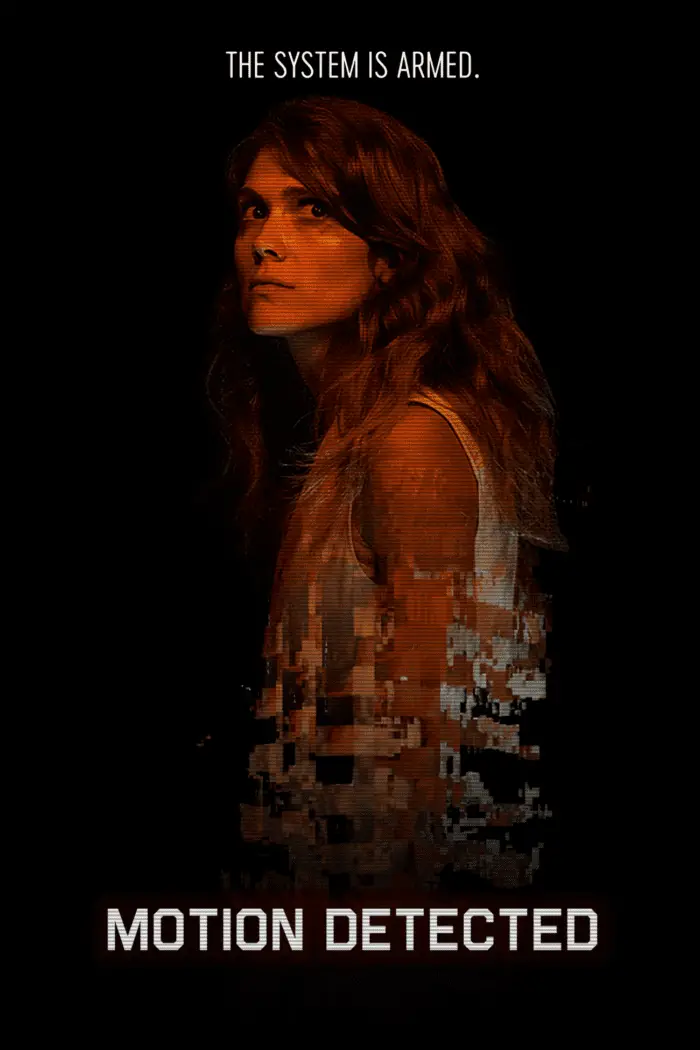Recently, I had the opportunity to sit down with writer/director Justin Gallaher and star Natasha Esca from Motion Detected, a newly released smart home psychological thriller. Despite some technical difficulties on my end—strangely fitting for a film about the dangerous overreliance on technology—our conversation was a fantastic glimpse into the making of the film. (The full audio is embedded below; the transcript has been edited for length and clarity.)
Tim: So Justin, when I was watching the film there were a couple of things that came to mind for me—mainly Black Mirror and Panic Room, what were some of your inspirations as you were making the film?
Justin: Uh, two films. One was The Shining, you know Jack Nicholson’s descent into madness there, was something we drew heavily on, and then The Invisible Man, which was, you know, there’s this presence that you can’t see that’s kind of manipulating you so that was also a big influence, ah but Black Mirror, yes, it could have been a part of that series, you know.
Tim: Yeah, and you have like two or three really relevant themes that you’re juggling. You’ve got this overreliance on technology, you’ve got female trauma and you’ve got dismissal of that trauma, it’s a lot to keep up in the air but I felt like you did a really good job handling all of it. So Natasha, a lot of what we see is just your character alone, and really the whole film really hinges on your performance. I felt like you really rose to the occasion, what was that like and what do you feel like you brought to the role of Eva?
Natasha: What I brought to the table character-wise, for Eva, it was a process of bringing Eva to life, and I think it was just putting myself in her shoes and doing things the way that I felt that she would do them. So when it comes to the way, you know, that she interacts with her husband, the way that she just speaks to herself when nobody is around, and it was an organic integration between me and her, and also having a lot of empathy for her situation, the trauma she lived in Mexico City, and how suddenly it’s all being brought back to life in a whole new city in a different country. This is something that she thought she was going to be able to move past but she can’t escape her past.
Tim: Yeah, and her heritage becomes this source of comfort and empowerment later in the film.
Natasha: I think that her spirituality and the aspect of religion were a very beautiful integration into the film and just made it more real. I consider myself a very spiritual person, so definitely in times of despair I turn to a higher power, so for Eva who’s going through everything that she’s going through and also herself being a spiritual person, she has her culture in Mexico City and she’s bringing that to Los Angeles, and this is where she’s starting over, so that’s a huge part of her, which I think that maybe wasn’t too obvious that her spirituality was a huge part of who she is. But for me personally, I feel like that was an important aspect of character development, in creating her, that faith that she has and her catholic roots from Mexico.

Tim: So Justin, how much of a difference was there between writing and directing versus just writing a film?
Justin: Well this was very specific, so we were writing with an efficiency of what we could shoot, whereas I think in general when you’re just writing you may not put artificial constraints on what you’re trying to do, right? Like, if you want to write a massive action sequence, you should write it, like you shouldn’t be like “Well it has to be two guys on bikes because we can’t get motorcycles,” but on this, it had to be bikes it couldn’t be motorcycles because we knew exactly what we would be up against. But in a way, those constraints made the writing process maybe a little bit similar, because we knew we had to keep it contained for eighty percent of the film in one location, with very few characters if not just one character, so we built the script around that, and that framework did help. And I think there were some things that we were struggling with, like how does a character by themselves talk without it just seeming like glaring exposition? And so we were working around some of those as well.
Tim: Yeah, sometimes I’m watching a film and it’s great but I’m thinking to myself, “Man, people do not talk like this in real life, this is just words from writers.”
Justin: Yeah, exactly. I think some of the success that we found was having her switch between Spanish and English because it was just like her brain is switching in this environment where she’s just like “What the hell is going on,” right? Where she would be like, on hold, and getting annoyed and then saying like “These assholes are never gonna answer the phone.”
Natasha: When I get annoyed, I get annoyed in Spanish, sorry for interrupting but it’s true.
Tim: Oh yeah, one of my best friends is a Latina woman and she very much gets angry in Spanish, so I’m very aware that that’s a thing.
Natasha: For dramatic emphasis of course, but I mean it just sounds so much better when you curse in Spanish.
Tim: Well yeah, of course. One final question that’s mostly for my own benefit, open to anyone. Later on in the film, most of Eva’s conversations with other characters are through video calls that we see on Diabolo’s screens, it almost feels like there’s a little bit of ambiguity as to whether or not
Justin: I think what we were trying to do with the therapist was have a continual voice of reason that brought Eva back from the brink each time, and you know we’re using that security camera angle to show that she’s being watched, there’s this third person in the room constantly, this invisible man presence, and it’s kind of listening to everything that’s being said: don’t drink coffee, don’t drink too much alcohol, get exercise, and through the paranoia ensuring that she does drink more coffee and she does drink a lot of alcohol. But I do think that in some of the calls we wanted it to feel a little ambiguous, is this your friend, right? And so in the last call, we have her face actually switch with a glitch into El Diabolo, to just kind of show that not all is what it’s supposed to be.
Tim: Interesting.
Justin: Yeah, I mean I think a lot of the ambiguity in the film is intentional, because we’re sort of in Eva’s mind here, and it’s what percentage of information are we being given that’s true? Just like the neighbor network, just like if you were on YouTube, it’s sort of that same idea of the rabbit hole, and so she’s processing all this information. And ultimately I think Eva doesn’t want to be crazy, and ultimately she’s not crazy, all of the stuff that she thinks is happening to her is real, but when you tell people that you sound completely psychotic. There’s a question I’ve gotten about why she doesn’t just leave the house, and I think the thing is because she’s such a strong person, so she stays there because she believes that it can’t hurt her because it’s this made up thing, it’s this fake thing so she’s going to ride it out. Doesn’t work out the best for her in the end, but she did it.
Tim: Yeah, especially because she has that history of trauma, so you say all these things are happening and people say it’s just flashbacks or just your mind playing tricks on you. Well, thank you for your time, thank you for putting up with all the technical difficulties, it was a pleasure talking to you!
Justin: Yeah, great talking to you!
Natasha: Great talking to you too!




